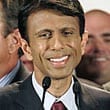Last week’s big story was President Barack Obama’s ambitious and expertly delivered address to Congress. However, the subplot — the nation’s first prime-time taste of Louisiana Governor Bobby Jindal, attracted its own share of attention.
Conventional wisdom, on both the left and right, is that the Republican rebuttal from Jindal (who many conservatives see as a savior) was an unqualified flop. Democrats loudly claim his address paled in comparison to the president’s. They are right. Many Republicans sadly whisper that Louisiana’s young governor is no Ronald Reagan. They are also right.
When he emerged in 1980 to deliver the country from Jimmy Carter’s era of malaise, Ronald Reagan was 69 years old and entering the twilight of his political calling. His career had spanned decades from two terms in California’s Statehouse to the Screen Actor’s Guild. The future president spent this time formulating his beliefs ideas and putting them into practice. That experience, coupled with his exceptional charisma and the confluence of the political stars created the revolution which bears his name.
That, to borrow a phrase form historian Doris Kearns Goodwin, was no ordinary time. The GOP’s endless longing to re-create it is fruitless and futile. Yet, Republicans would be foolish to jettison Jindal and his enormous promise.
At age 37, he is the youngest governor in the country. Small and slim, he is not possessed of movie star charisma. Where Reagan masterfully communicated transcendental themes, Jindal is an enthusiastic wonk, seemingly comfortable discussing and engaging in the minutia of policy debates. In many ways, at least superficially, Jindal is the opposite of Reagan. And going forward, that might be exactly what the Republican Party needs.
The past several national elections have seen the GOP, chasing after the Gipper’s ghost, nominate candidates with some of the right core convictions and the ability to communicate broad themes. Yet they often seemed paralyzed when it came to explaining their own policy prescriptions and incapable of actually articulating the distinction between conservatism and liberalism. Accordingly, inarticulate Republicans have been defined downward by their opposition — a recipe for almost certain defeat at the polls.
Last Tuesday’s response to the president made it abundantly clear that Jindal is not yet in the rhetorical league of Presidents Reagan or Obama. He is, however, already their equal in terms of intellect and policy expertise. Not yet 40, Jindal, a Rhodes Scholar, has already helped salvage Louisiana’s Medicare as secretary of Louisiana’s Department of Health and Hospitals, served as president of his state’s university system, served as an assistant secretary at the U.S. Department of Health and Human Services and been twice elected to the U.S. House of Representatives. Only in the second year of his first term as the Pelican state’s governor, there is plenty of time for his rhetorical skills to catch up to his policy expertise.
In this sense, he is reminiscent of a past president from a nearby state. In 1978, at age 32, William Jefferson Clinton was elected governor of Arkansas. The “Boy Governor” as Clinton was known, was, like Jindal a highly ambitious Rhodes Scholar who seemed most comfortable digging through the weeds of arcane policy debates.
Because of his intellect, youth and ambition, by the end of the 1980s, Arkansas’ governor was touted as a prospective future leader of the Democratic Party. In July 1988, Clinton delivered the nominating speech at the Democratic National convention for presidential candidate Michael Dukakis. The plodding 32 minute speech which only roused its audience when Clinton uttered “In conclusion…,” was considered a failure. And yet, a little more than four years later, Clinton was addressing another audience from the steps of the West portico of the U.S. Capitol.
Like Clinton’s nominating speech in 1988, last Tuesday’s rebuttal to President Obama was not Jindal’s finest moment. But, just as it would have been foolish to bet against the “Boy Governor,” it would be just as unwise to think that we will not be hearing from Louisiana’s young chief executive again.























